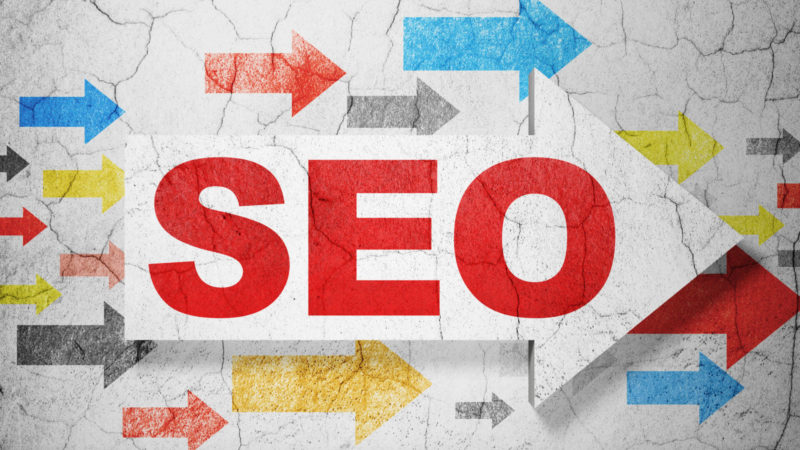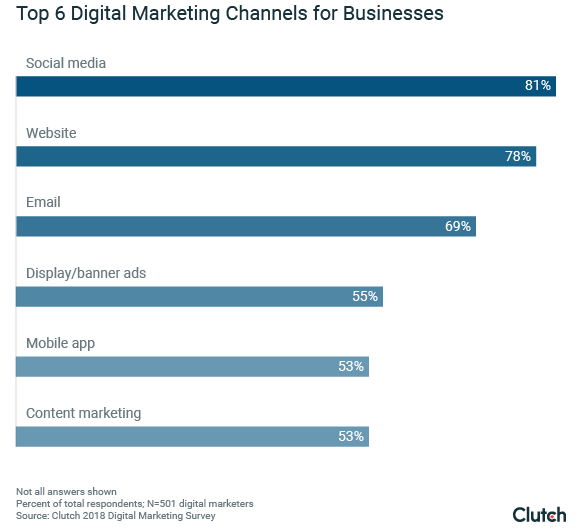iklan3
Only 44% of businesses said SEO was a part of their digital strategy.
A recent survey from Clutch found that SEO was the “least popular digital marketing channel” among the choices offered in the survey. Clutch polled 501 marketers from companies of various sizes with at least 100 employees, with revenues from under $50 million to more than $500 million.
Clutch asked, “What digital marketing channels does your company participate in? (i.e., spends time and/or money on).” The following are the top six, according to the survey.
Reportedly, only 44 percent of businesses spend time or money on SEO. That result is pretty surprising, if not inexplicable. Paid search marketing ranked just below content marketing with 47 percent responding that they used it.
Clutch seems surprised by the SEO finding as well and tries to explain why SEO ranked as poorly as it did. The company says that many businesses (and presumably, marketers within those organizations) don’t understand SEO, combined with the fact that SEO results “aren’t immediately obvious.”
It’s certainly true that SEO takes time to show results and that many marketers don’t understand the mechanics and best practices of SEO. However, it’s still very surprising that the majority (56 percent) say they aren’t doing anything to optimize their rankings.
The top marketing objective of the survey population was to increase sales and revenue. This is a direct response objective, which search has historically accomplished better than any other digital channel, with the possible exception of email. It’s also interesting to note that “increase website traffic” was a goal of only 11 percent of these marketers — website visits are a precursor for conversions, presumably. One inference is that people are no longer looking to their websites to drive conversions.
Does this mean that marketers have lost faith or given up on SEO? Many other surveys over the past several years have found that SEO typically ranks in the top three marketing strategies among small businesses and enterprises alike. However, in the recent past, many marketers have become pessimistic or frustrated about traditional SEO in an environment now dominated by mobile search and an increasing volume of ads “above the fold.”
It’s important to note, however, that SEO has continued to evolve as platforms and technologies have evolved. SEO should today be defined to include optimization for voice assistants. Regardless of what we call it, data and content optimization remain critical to visibility in search, which is a primary tool for pre-purchase research and content discovery.
SOURCE : searchengineland.com
A recent survey from Clutch found that SEO was the “least popular digital marketing channel” among the choices offered in the survey. Clutch polled 501 marketers from companies of various sizes with at least 100 employees, with revenues from under $50 million to more than $500 million.
Clutch asked, “What digital marketing channels does your company participate in? (i.e., spends time and/or money on).” The following are the top six, according to the survey.
Reportedly, only 44 percent of businesses spend time or money on SEO. That result is pretty surprising, if not inexplicable. Paid search marketing ranked just below content marketing with 47 percent responding that they used it.
Clutch seems surprised by the SEO finding as well and tries to explain why SEO ranked as poorly as it did. The company says that many businesses (and presumably, marketers within those organizations) don’t understand SEO, combined with the fact that SEO results “aren’t immediately obvious.”
It’s certainly true that SEO takes time to show results and that many marketers don’t understand the mechanics and best practices of SEO. However, it’s still very surprising that the majority (56 percent) say they aren’t doing anything to optimize their rankings.
The top marketing objective of the survey population was to increase sales and revenue. This is a direct response objective, which search has historically accomplished better than any other digital channel, with the possible exception of email. It’s also interesting to note that “increase website traffic” was a goal of only 11 percent of these marketers — website visits are a precursor for conversions, presumably. One inference is that people are no longer looking to their websites to drive conversions.
Does this mean that marketers have lost faith or given up on SEO? Many other surveys over the past several years have found that SEO typically ranks in the top three marketing strategies among small businesses and enterprises alike. However, in the recent past, many marketers have become pessimistic or frustrated about traditional SEO in an environment now dominated by mobile search and an increasing volume of ads “above the fold.”
It’s important to note, however, that SEO has continued to evolve as platforms and technologies have evolved. SEO should today be defined to include optimization for voice assistants. Regardless of what we call it, data and content optimization remain critical to visibility in search, which is a primary tool for pre-purchase research and content discovery.
SOURCE : searchengineland.com



